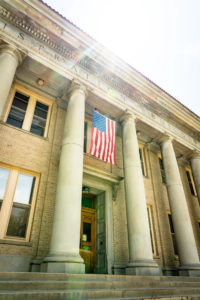Fifteen new students have been selected to the prestigious VPR Graduate Fellows program for 2023-24, a program sponsored by the Office of the Vice President for Research.
 The program accelerates excellence in research by engaging top students from programs across the University. VPR Fellows are eligible to receive up to $4,000 each in scholarships and travel support to present at academic conferences and will attend professional development workshops to help them successfully transition to their careers after graduation.
The program accelerates excellence in research by engaging top students from programs across the University. VPR Fellows are eligible to receive up to $4,000 each in scholarships and travel support to present at academic conferences and will attend professional development workshops to help them successfully transition to their careers after graduation.
Now in its eighth year, the program is designed to be a transformative scholarly experience for the students as well as for faculty to mentor next-generation talent. The new cohort represents 14 departments and units and seven colleges at CSU.
“In their early careers, these students have already demonstrated excellence, creativity, and a commitment to innovation. Now they will have a unique opportunity to participate in a curriculum that enriches their sense of agency, celebrates diversity, equity and inclusion, and highlights the power of team science approaches,” said Heather Pidcoke, CSU’s chief medical research officer. “The OVPR leadership team learns from every cohort and the VPR Fellows learn to see themselves as future leaders in discovery.”
Aaunterria Bollinger-Deters, a new Fellow from the College of Liberal Arts, said the funds and support afforded by the program are a big career boost.
“Being awarded the VPR Fellowship means that I can confidently apply for professional development opportunities like conferences and not be worried about raising money for travel expenses,” Bollinger-Deters said. “As a doctoral student planning to enter the job market next year, access to the funds from this award has the potential to be career altering as I continue to grow my professional network, and I am very grateful.”